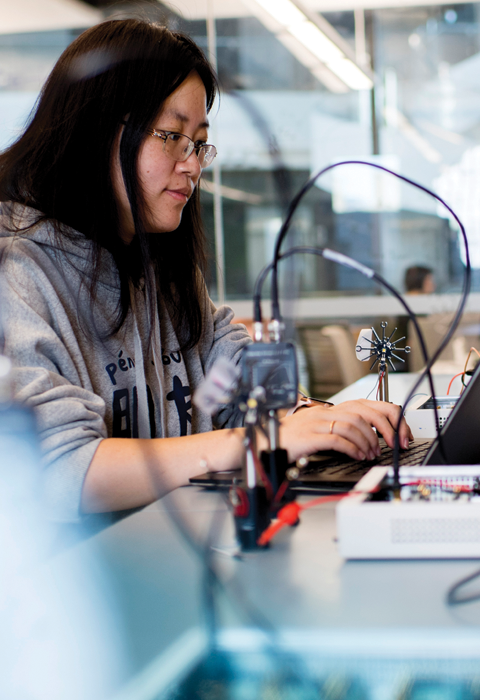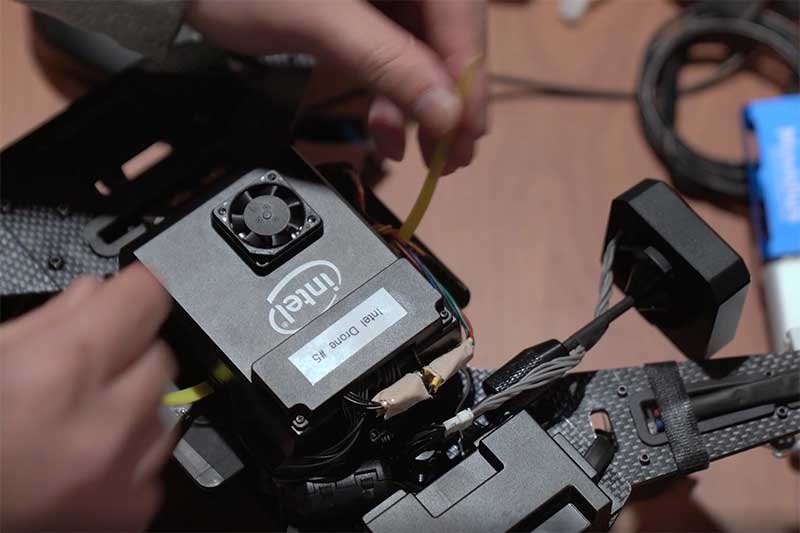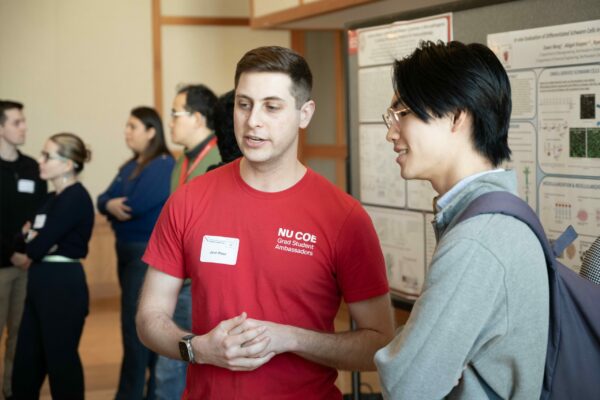
PhD in Computer Engineering
PhD in Computer Engineering
Overview
Northeastern’s PhD program in Computer Engineering offers the opportunity to pursue cutting-edge research in the following areas: computer architecture, parallel computing, fault tolerance, performance analysis and modeling, security, embedded systems, VLSI, algorithms, data mining, testing, machine learning, machine vision and software engineering.
Innovative Curriculum
Northeastern offers a PhD in Computer Engineering that is completely research-based with minimal and flexible course requirements which can be pursued as full-time or part-time. As a computer engineering student at Northeastern, you will study computer architecture, software engineering, computer-aided design (VLSI), microprocessor-based design, and applied algorithms.
In addition to a broad background in mathematics, physics, and chemistry, this curriculum gives you solid foundation in both hardware and software design. RISC microprocessors, object-oriented Java, and cellular networks are just three of the technologies you will encounter in the program.
In the past ten years, the internet has revolutionized all aspects of our lives, from the way we communicate to the way we do business. Wireless communication, online commerce, medicine, and multimedia are examples of new applications that have transformed our world. Computer engineers developed the fundamental technologies that made the web possible, including high-performance microprocessors, gigabit networks, and object-oriented computer languages. Demand for computer engineers has increased dramatically in recent years. Students with a strong background in computer engineering are aggressively recruited by cutting-edge computer companies nationwide.
The ECE department offers a variety of graduate courses giving students the flexibility in planning their course requirements according to their research requirements and personal interests. Many graduate courses are offered in two sections; in-class and streaming video. Part-time students and full-time students who have schedule conflicts can register in the streaming video sections.
- Northeastern ECE is the host or major partner in nine state-of-the-art research centers
- Financial support available
- Internationally-recognized Internships & Co-op opportunities
- Professional Development Workshop Series to complement the research and classroom experiences
- Northeastern ECE is a research powerhouse in the Boston area and beyond
- An ability to identify, formulate, and solve complex engineering problems.
- An ability to explain and apply engineering design principles, as appropriate to the program’s educational objectives.
- An ability to produce solutions that meet specified end-user needs.
- An ability to apply analytical, numerical, and/or experimental methods to analyze and design complex engineering systems, and to identify, formulate, and solve new challenging computer engineering problems.
- An ability to direct independent scientific research in computer engineering and related fields.
- An ability to formulate new research plans and communicate the research outcomes (both oral and written communication of research results).
- Qualifying exam: Students who already hold an MS degree and matriculate in the fall semester must take the qualifying exam in the spring semester of their first year. Students matriculating in spring semester, or students who hold a BS degree and matriculate in the fall semester , can postpone the exam to the second spring semester. Those who fail the exam the first time, have one more chance to take the exam. These students must take the exam the next spring after their first attempt.
- Research Advisor: Students should have a research advisor one year after their matriculation.
- Thesis Committee: The Dissertation Committee must be formed not later than six months after passing the qualifying exam.
- Comprehensive exam: The deadline for comprehensive exam is two years after passing the qualifying exam.
- Dissertation Defense: The dissertation defense should be scheduled at least one year after taking the comprehensive exam.
The Electrical and Computer Engineering department offers a variety of graduate courses giving students flexibility of planning their course requirements according to their research requirements and personal interests. Many of graduate courses are offered in two sections; in-class and streaming video. Part-time students and full-time students who have schedule conflicts can register in the streaming video sections.
Our graduates pursue careers within academia and beyond.
- Ditto Labs
- Lousiana Tech University
- Draper Laboratories
- National Institutes of Health
- Intel
- Bose Corp.
- The Mathworks
Experiential Learning
With a large number of high-tech firms in and around Boston, both start-ups and large multinational corporations, many PhD students do an internship during their program while remaining right here in Boston. Often their advisor is instrumental in identifying the internship position, with a funding sponsor or research collaborator, be they in Boston or elsewhere in the United States. Internships can be informally arranged for several months at any time during the calendar year.
PhD students can also take advantage of the more formally arranged co-op program which entails up to 8 months of work experience preceded by several professional development courses to prepare students. The Cooperative Education Program, also known as a “co-op,” is one of the largest and most innovative in the world, and Northeastern is one of only a few that offers a co-op program for graduate students. Through this program, students gain professional experience, employed in their field of interest as part of the academic curriculum. Northeastern has more than 3,000 co-op employer partners. Another option for PhD students is the university’s Experiential PhD program.
Academic Advising
The Academic Advisors in the Graduate Student Services office can help answer many of your questions and assist with various concerns regarding your program and student record. Use the link below to also determine which questions can be answered by your Faculty Program Advisors and OGS Advisors.
Admissions & Aid
Ready to take the next step? Review degree requirements to see courses needed to complete this degree. Then, explore ways to fund your education. Finally, review admissions information to see our deadlines and gather the materials you need to Apply.




